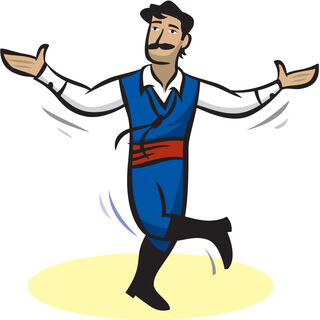Stress
Unleash Your Inner Zorba the Greek
Finding meaning in the dance of life.
Posted October 5, 2021 Reviewed by Ekua Hagan
Key points
- Music and dance are powerful motivators for managing stress and dealing with life's challenges.
- More than music alone, dance offers opportunities for creative expression and uplifting the human spirit.
- Connecting authentically with others is an important source of meaning.

In one of the most memorable and meaningful scenes from the Academy Award-winning movie Zorba the Greek, the title character Alexis Zorba is asked by his uptight, existentially challenged boss, Basil, to teach him how to dance. While this may appear to be an unusual request, it makes sense in the context of the plot of the movie. Throughout the film, Zorba (played by Anthony Quinn) is consistently encouraging his boss Basil (played by Alan Bates) to relax and not take everything so seriously.
This advice represents an important lesson in life, supported by common sayings today such as, “Don’t sweat the small stuff,” “Go with the flow,” and “Know what you can control and what you can’t control.” Putting this important advice into practice can help you address a stressful situation in both your personal life and work life. In some cases, by shifting your focus of attention from something stressful to something more positive, you will be able to actually alleviate the stress you are feeling, both physically and mentally, as well as connect with the deeper meaning in any situation.
Basil fails to heed this important message from Zorba until finally, near the end of the movie, he is confronted with such an overwhelming situation that he is jarred into looking for an alternative approach. In this particular scene, his entire logging venture falls apart and all he can do is watch helplessly as log after log falls to the ground. Despite all his hard work, Basil is now left without a viable logging enterprise. In a deeper sense, he is facing an existential challenge. Without his business venture into which he invested all of his money, what is he to do now? How will he cope?
The final scene of the movie takes place on a beach where Basil finally comes to grip with his predicament. He turns to his friend and asks him to teach him to dance. With a look of surprise, the spirited Zorba responds with the words: “Dance? Did you say, 'Dance’?!” And the movie famously ends with both men dancing together enthusiastically on the beach (see the scene here).
The movie offers several key lessons about stress and finding deeper meaning in any situation:
- Dancing captures the spirit of life and offers us an engaging and cathartic expression, which is more powerful than simply listening to music alone. Moreover, according to Patricia Riak, Ph.D., a social anthropologist, Greek dance is an important correlate and determinant of kefi1, “a social activity that engages the relationship between self and collectivity.”2 In this sense, dance represents both an opportunity to express emotions and to surrender to them. Besides being a physical and emotional outlet, dance, in other words, represents the unleashing of one's spirit along with the integration of spirit, mind, and body at the same time.
- Dance offers us an opportunity to extend beyond ourselves and strengthen our social bonds with others. The social value of dance is priceless as each person becomes an accepted and connected member of the collective. In the movie, Zorba bonded with Basil as they both shared and supported each other in friendship through the dance.
- Dance offers us an opportunity to shift our focus of attention to something more positive. In this case, Basil was able to forget, even if it was just momentarily, about his lost logging venture; instead, he was able to focus on and enjoy the experience on the beach. By not becoming a prisoner of his own thoughts, this approach also served to reenergize him to carry on and respond to his situation in a more healthy and meaningful way.
Watching the personal transformation of Basil as he interacts and eventually dances on the beach with Zorba in the final scene, ideally, encourages and challenges each of us to find our own inner “Zorba.” Indeed, wouldn’t it be great if we all could unleash our inner Zorba wherever we are, whenever we need to?
To get you in the mood and spirit of Zorba, I invite you to watch the award-winning, short animated film, Mariza, produced by our dear friend and colleague, Constantine Krystallis. Among other takeaways, Mariza will show you in a very creative and entertaining way something about the deeper meaning of music and dance, including their role as a way to manage stress and deal with life’s inevitable challenges.
References
1. Both for dancers and observers alike, the notion of kefi can be described as a heightened sense and experience of what Greeks call “OPA!” For more information about the common Greek word “OPA!”, including its origins and influence on the human quest for meaning, see: Alex Pattakos and Elaine Dundon (2015). The OPA! Way: Finding Joy & Meaning in Everyday Life & Work. Dallas: BenBella Books. Moreover, for practical guidance on how the OPA! concept can be used to find meaning in life, work, and society, see: Alex Pattakos and Elaine Dundon (2017). Prisoners of Our Thoughts: Viktor Frankl’s Principles for Discovering Meaning in Life and Work, 3rd edition. Oakland: Berrett-Koehler Publishers.
2. Patricia Riak (2007). “A Cultural Interpretation of Greek Dance,” Journal of the Hellenic Diaspora, Vol. 33 (1&2). New York, New York: Pella Publishing, pp. 39-59.


